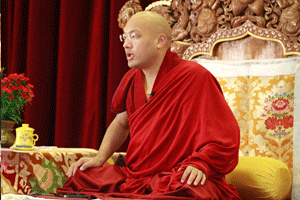9th March 2013 –Central University of Tibetan Studies, Sarnath.
Today, the Gyawang Karmapa accepted a request for a talk from the Central University of Tibetan Studies in Sarnath, India. Sitting majestically on an elaborately carved throne, he first received ceremonial scarves from the faculty and administration of the University.
The Karmapa began his talk by encouraging people to take a larger, long-term view of the Tibetan situation and think about the ways to improve it. The University has an excellent library, which can serve as a support for extended research. It is also true that many Tibetans now live in India, the ancestral home of Buddhism, and this provides another opportunity for research. Indian has many of the remains of Buddhist civilization but if you look around there are no individuals at these sites holding the tradition. In Tibet, however, the tradition was preserved in lineages passed from teacher to student down to this present day, so the two situations are complementary, and Tibetans can give back to India something Indians themselves can respect.
On the other hand, there are also things that have been disappointing. Some people, including Tibetans, are refuting Buddhism; however, we can use this as an opportunity to look for new reasonings and responses that will develop fresh experience. If we look back at Tibetan history, we can see another difficulty: the greatest problems have come from divisions between the religious traditions. What can we do about it? We can look at the whole range of religious traditions without a sectarian focus. This is extremely important, for it has been said in the treatises that if Buddhism comes to an end, it will not be from outside forces but from the competition between various religious traditions. We can all succumb to this, and so everyone has to be careful. We should reflect on all the detrimental effects of sectarian rivalry and make a commitment not to get involved.
When we take refuge in the Buddha, Dharma, and Sangha, we do not say I take refuge in the Buddha of my tradition, in the Dharma of my tradition, and in the Sangha of my tradition. We take refuge in all the Buddhas, in the complete Dharma, and in the entire sangha. If we do not let go of our own opinions, how can we decide what is true? It is difficult to say if one teaching is good or bad. For example, the teachings on emptiness are not for everyone, so if someone is not ready, that Dharma is not appropriate for them. The same is true for the Secret Mantrayana. Therefore, we should keep our minds open and free of prejudice. The Dalai Lama’s teachings have spread throughout the world because he relates freely to all religions and all traditions of Buddhism. If we can have a similar intention and openness, our activity can also spread. Making connections with others is very important, especially if we look at the long-term.
Afterward, the Karmapa’s talk was translated into Hindi, and he generously gave a blessing to each of the students, which included monks and nuns, lay men and women.



